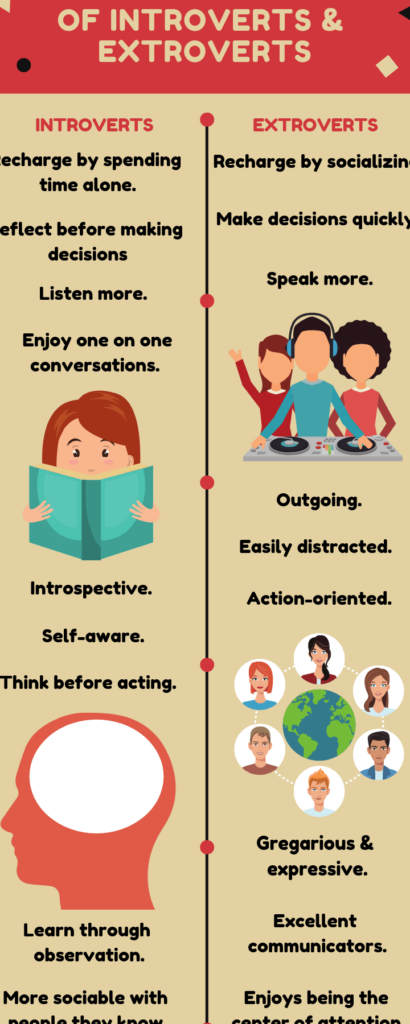
The Extrovert Meaning: Understanding the Power of Outgoing Personalities

Discover the meaning of being an extrovert and how it influences our relationships and daily interactions. Unveil the power and significance of embracing one's outgoing nature in today's society.
The Essence of Extroversion: Unveiling the True Meaning
The Essence of Extroversion:
Maybe you may be interestedThe Definitive Guide to Understanding GFQ MeaningExtroversion is often misunderstood and oversimplified in popular culture. It is not simply about being outgoing or talkative, but rather a complex interplay of social behaviors and motivations.
Unveiling the True Meaning:
Maybe you may be interestedDecoding HMU: Uncovering the Meaning Behind this Popular AcronymTo understand the true essence of extroversion, one must delve deeper into the underlying psychological processes that drive extroverted behavior. This includes factors such as sociability, assertiveness, excitement-seeking, and positive emotionality.
Research suggests that extroversion is linked to dopamine levels in the brain, which may explain why extroverts are often more responsive to rewards and seek out stimulating social environments.
Maybe you may be interestedThe True Hustle Meaning: Unveiling the Secrets Behind the Hustler LifestyleIn essence, extroversion is not just a surface-level personality trait but a multidimensional construct that influences how individuals engage with the world around them. Recognizing the complexity and nuances of extroversion can lead to a deeper appreciation of the diverse ways in which people interact and experience life.
What is an extrovert person?
An extrovert person is someone who tends to be outgoing, sociable, and energized by interacting with others. They often enjoy being the center of attention, engaging in social activities, and feel comfortable in group settings. Extroverts typically draw energy from being around people and may find solitude draining. In contrast to introverts, who recharge by spending time alone, extroverts thrive on social interactions and external stimulation.
Maybe you may be interestedUnlocking the Indeed Meaning: Exploring the Depths of SignificanceWhat is the difference between introvert and extrovert?
Introvert and extrovert are terms used in psychology to describe different personality types. An introvert is someone who tends to be more inward-looking, feeling recharged by spending time alone or in small groups, and may find social interactions draining. On the other hand, an extrovert is someone who is more outward-looking, gaining energy from being around others and often seeking out social situations.
The main difference between an introvert and an extrovert lies in their preferred sources of energy and stimulation. While an introvert may enjoy solitude and introspection, an extrovert thrives on social interactions and external stimuli. It's important to note that these are not strict categories, as most people fall somewhere along the spectrum between introversion and extroversion, exhibiting traits of both to varying degrees.
Maybe you may be interestedInnovation: Unveiling the Meaning Behind ProgressWhat is an introvert?
An introvert is someone who tends to be more focused on internal thoughts and feelings rather than seeking out external stimulation. They often prefer spending time alone or in small groups, as large social gatherings can be draining for them. Introverts typically recharge by having alone time or engaging in solitary activities, such as reading, writing, or pursuing hobbies. While they may enjoy social interactions, they tend to limit the amount of time spent in such situations in order to maintain their mental and emotional well-being.
What are the 4 types of extrovert?
In the context of the meaning of things, there are four types of extroverts based on the research by psychologist Carl Jung. These types include:
Maybe you may be interestedDecoding the LMAO Meaning: Why We Laugh 'til We Cry1. Social extroverts: These individuals are outgoing, friendly, and enjoy socializing with others. They draw energy from being around people and thrive in social settings.
2. Aggressive extroverts: This type of extrovert is assertive, confident, and often takes charge in social situations. They are not afraid to speak their minds and can be seen as dominant in group settings.
Maybe you may be interestedThe Profound Love Meaning: Exploring the Depths of Emotion3. Reserved extroverts: Reserved extroverts are more introspective and thoughtful in their social interactions. They can be sociable and enjoy spending time with others, but also need time alone to recharge.
4. Excitable extroverts: These extroverts are energetic, enthusiastic, and have a high level of excitement in social situations. They are often the life of the party and bring a lot of energy to any gathering.
Understanding these different types of extroverts can help us appreciate the diversity within extroverted personalities and how they engage with the world around them.
Frequent questions
What is the true meaning of being an extrovert?
The true meaning of being an extrovert is finding energy and fulfillment through social interactions, feeling comfortable in group settings, and being outgoing and expressive in one's interactions with others.
How does an extrovert's personality impact the meaning of things in different situations?
An extrovert's personality impacts the meaning of things by often seeking external validation and stimulation, leading to a preference for social interactions and experiences that emphasize connection and activity.
Can being an extrovert change the way we perceive the meaning of life and relationships?
Being an extrovert can influence the way we perceive the meaning of life and relationships by emphasizing social connections, experiences, and external validation more prominently in our understanding of meaning and fulfillment.
Si quieres conocer otros artículos parecidos a The Extrovert Meaning: Understanding the Power of Outgoing Personalities puedes visitar la categoría SOCIETY.




